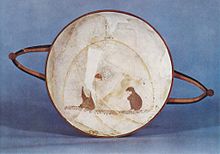Glaucus (son of Minos)

Glaukos ( Greek Γλαῦκος ), the son of Minos and Pasiphaë , was brought back to life in Greek mythology after he died.
myth
While playing a ball, or trying to catch a mouse in the storage cellar, Glaucos fell into a large vessel full of honey and suffocated in it. When his father Minos missed him, he asked for him, but nobody found him. Therefore he asked the oracle and received - either from Apollo or from the Curetes - the answer that a miraculous being had been born; whoever can see a parable for it will also find the child. Now a calf had been born in the herds of Minos, which changed its color from white to red to black in the course of the day.
The seer Polyidos - or according to another tradition Asklepios , who came to Crete - compared the cow with the fruits of the blackberry bush or those of the mulberry tree . So he was given the job of looking for Glaucos. He watched an owl chasing away bees at the entrance to a wine cellar; he went in, found the child and brought it to Minos. However, the king now demanded that he resuscitate the corpse and locked the seer together with the dead son in a burial chamber.
Polyidus had no advice. Then he watched a snake approach the corpse and killed the animal with his staff. Now a second snake came, saw the dead animal and immediately disappeared again. When she returned she had a herb in her mouth; she put it on the dead snake, and it came to life. Now the seer put the same herb on the corpse of Glaucus, which was also brought back to life. According to another tradition, the animals were not two snakes, but two dragons.
However, Minos did not want the seer to return to his homeland Argos until he had taught Glaucos his art. Polyidos obeyed, but when he parted he asked the boy to spit in his mouth. He did it and so, without realizing it, gave his wisdom back to the seer.
See also
swell
- Libraries of Apollodorus 3, 7; 3, 17; 3, 20; 3, 121.
- Hyginus Mythographus , De astronomia .
- Hyginus Mythographus, Fabulae 49; 136; 251.
- Ovid , Fasti 6, 733.
literature
- Rudolph Gaedechens: Glaukos 9 . In: Wilhelm Heinrich Roscher (Hrsg.): Detailed lexicon of Greek and Roman mythology . Volume 1, 2, Leipzig 1890, Col. 1686–1688 ( digitized version ).
Individual evidence
- ^ Karl Kerényi, The Mythology of the Greeks , Vol. I, p. 89. ISBN 3-423-01345-1
- ^ Karl Kerényi, The Mythology of the Greeks , Vol. I, p. 90. ISBN 3-423-01345-1